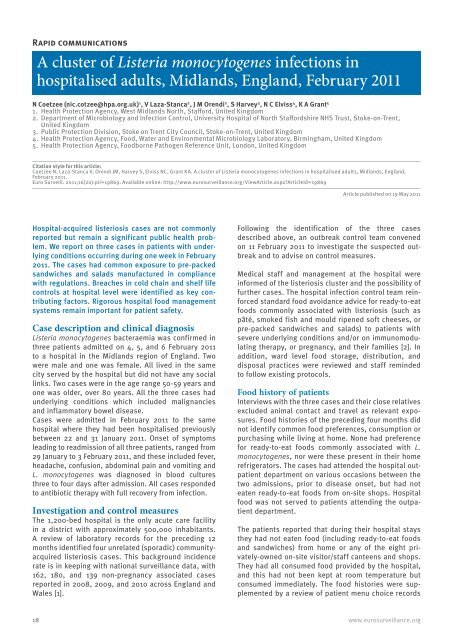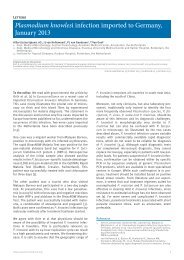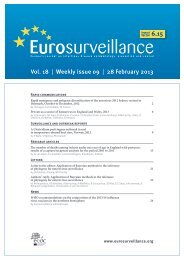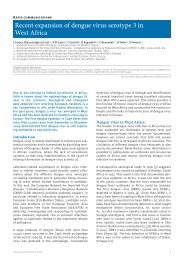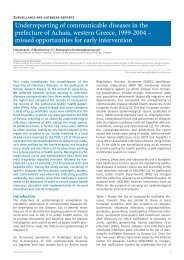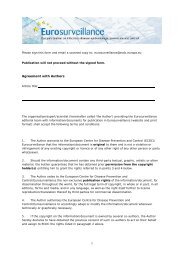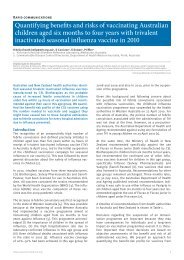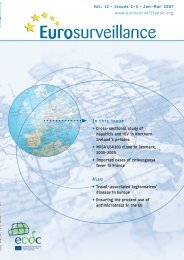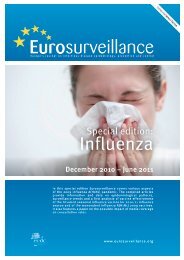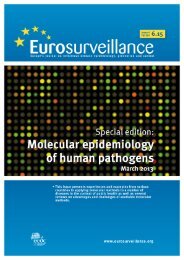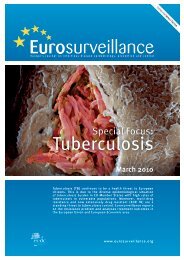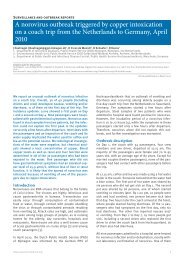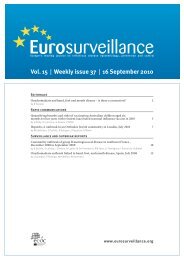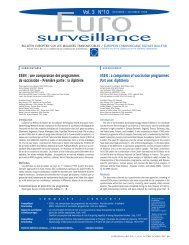Escherichia coli - Eurosurveillance
Escherichia coli - Eurosurveillance
Escherichia coli - Eurosurveillance
You also want an ePaper? Increase the reach of your titles
YUMPU automatically turns print PDFs into web optimized ePapers that Google loves.
Rapid communications<br />
A cluster of Listeria monocytogenes infections in<br />
hospitalised adults, Midlands, England, February 2011<br />
N Coetzee (nic.cotzee@hpa.org.uk) 1 , V Laza-Stanca 2 , J M Orendi 2 , S Harvey 3 , N C Elviss 4 , K A Grant 5<br />
1. Health Protection Agency, West Midlands North, Stafford, United Kingdom<br />
2. Department of Microbiology and Infection Control, University Hospital of North Staffordshire NHS Trust, Stoke-on-Trent,<br />
United Kingdom<br />
3. Public Protection Division, Stoke on Trent City Council, Stoke-on-Trent, United Kingdom<br />
4. Health Protection Agency, Food, Water and Environmental Microbiology Laboratory, Birmingham, United Kingdom<br />
5. Health Protection Agency, Foodborne Pathogen Reference Unit, London, United Kingdom<br />
Citation style for this article:<br />
Coetzee N, Laza-Stanca V, Orendi JM, Harvey S, Elviss NC, Grant KA. A cluster of Listeria monocytogenes infections in hospitalised adults, Midlands, England,<br />
February 2011.<br />
Euro Surveill. 2011;16(20):pii=19869. Available online: http://www.eurosurveillance.org/ViewArticle.aspx?ArticleId=19869<br />
Hospital-acquired listeriosis cases are not commonly<br />
reported but remain a significant public health problem.<br />
We report on three cases in patients with underlying<br />
conditions occurring during one week in February<br />
2011. The cases had common exposure to pre-packed<br />
sandwiches and salads manufactured in compliance<br />
with regulations. Breaches in cold chain and shelf life<br />
controls at hospital level were identified as key contributing<br />
factors. Rigorous hospital food management<br />
systems remain important for patient safety.<br />
Case description and clinical diagnosis<br />
Listeria monocytogenes bacteraemia was confirmed in<br />
three patients admitted on 4, 5, and 6 February 2011<br />
to a hospital in the Midlands region of England. Two<br />
were male and one was female. All lived in the same<br />
city served by the hospital but did not have any social<br />
links. Two cases were in the age range 50-59 years and<br />
one was older, over 80 years. All the three cases had<br />
underlying conditions which included malignancies<br />
and inflammatory bowel disease.<br />
Cases were admitted in February 2011 to the same<br />
hospital where they had been hospitalised previously<br />
between 22 and 31 January 2011. Onset of symptoms<br />
leading to readmission of all three patients, ranged from<br />
29 January to 3 February 2011, and these included fever,<br />
headache, confusion, abdominal pain and vomiting and<br />
L. monocytogenes was diagnosed in blood cultures<br />
three to four days after admission. All cases responded<br />
to antibiotic therapy with full recovery from infection.<br />
Investigation and control measures<br />
The 1,200-bed hospital is the only acute care facility<br />
in a district with approximately 500,000 inhabitants.<br />
A review of laboratory records for the preceding 12<br />
months identified four unrelated (sporadic) communityacquired<br />
listeriosis cases. This background incidence<br />
rate is in keeping with national surveillance data, with<br />
162, 180, and 139 non-pregnancy associated cases<br />
reported in 2008, 2009, and 2010 across England and<br />
Wales [1].<br />
Article published on 19 May 2011<br />
Following the identification of the three cases<br />
described above, an outbreak control team convened<br />
on 11 February 2011 to investigate the suspected outbreak<br />
and to advise on control measures.<br />
Medical staff and management at the hospital were<br />
informed of the listeriosis cluster and the possibility of<br />
further cases. The hospital infection control team reinforced<br />
standard food avoidance advice for ready-to-eat<br />
foods commonly associated with listeriosis (such as<br />
pâté, smoked fish and mould ripened soft cheeses, or<br />
pre-packed sandwiches and salads) to patients with<br />
severe underlying conditions and/or on immunomodulating<br />
therapy, or pregnancy, and their families [2]. In<br />
addition, ward level food storage, distribution, and<br />
disposal practices were reviewed and staff reminded<br />
to follow existing protocols.<br />
Food history of patients<br />
Interviews with the three cases and their close relatives<br />
excluded animal contact and travel as relevant exposures.<br />
Food histories of the preceding four months did<br />
not identify common food preferences, consumption or<br />
purchasing while living at home. None had preference<br />
for ready-to-eat foods commonly associated with L.<br />
monocytogenes, nor were these present in their home<br />
refrigerators. The cases had attended the hospital outpatient<br />
department on various occasions between the<br />
two admissions, prior to disease onset, but had not<br />
eaten ready-to-eat foods from on-site shops. Hospital<br />
food was not served to patients attending the outpatient<br />
department.<br />
The patients reported that during their hospital stays<br />
they had not eaten food (including ready-to-eat foods<br />
and sandwiches) from home or any of the eight privately-owned<br />
on-site visitor/staff canteens and shops.<br />
They had all consumed food provided by the hospital,<br />
and this had not been kept at room temperature but<br />
consumed immediately. The food histories were supplemented<br />
by a review of patient menu choice records<br />
18 www.eurosurveillance.org


